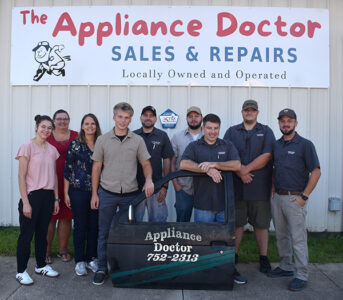Iowans voice support, opposition to IHAWP work requirements

T-R PHOTO BY LANA BRADSTREAM American Cancer Society Cancer Action Network Iowa Government Relations Director Jackie Cale shares concerns about negative effects Iowans will experience if work requirements for IHAWP are put into effect. She spoke at an Iowa Department of Health and Human Services public hearing at the Marshalltown Public Library on Tuesday.
People voiced their concerns and asked unanswered questions during the final hearing regarding proposed Iowa Health and Wellness Plan (IHAWP) requirements.
The Iowa Department of Health and Human Services (HHS) hearing was the second in the state, and was held at the Marshalltown Public Library on Tuesday. Roughly 20 people attended in person, but the hearing was also streamed via Zoom so others across the state could participate.
An explanation on how the hearing was going to be conducted was given, along with a brief statement that no questions would be answered. HHS Medicaid Program Manager Tashina Hornaday broke down the amendment which the state is requesting. Through the amendment, the state wants to implement work requirements for eligible people to reduce the dependence of low-income Iowans on public assistance programs while advancing economic stability.
People must work at least 100 hours per month or earn the minimum wage equivalent of those hours, be enrolled in school or a job skills program, be enrolled in work requirements for Temporary Aid to Needy Families or Supplemental Nutrition Assistance Program or serve as a caregiver for someone who is disabled.
Not everyone on IHAWP will have to fit into one of those requirement categories. Exempt from the proposed amendment is anyone:
• Younger than 19 or 65 and older;
• Women with a high-risk pregnancy;
• Taking care of children younger than 6;
• Determined to be disabled by the United States Social Security Administration;
• Identified as medically exempt under Medicaid;
• Receiving unemployment approved by the Iowa Workforce Development;
• Participating in substance use disorder treatment which does not last longer than six months;
• Who can provide a good cause as defined by HHS.
People who meet one of the requirement categories or fit one of the exemptions will continue to receive IHAWP coverage. If approved, the IHAWP work requirements will go into effect January 2026.
Leigh Bauder of Bauder Consulting was the first person to approach the microphone and said she supports the amendment.
“I have seen abuse over the years of the system, so I am very excited about the work requirements which will encourage jobs and will encourage education of citizens in Iowa,” she said.
However, Bauder said there is a lot of confusion and fear regarding the amendment. One of the more common fears she has heard from her clients is what do they do if they can’t find a job. Another fear Bauder heard is how to juggle a job with other responsibilities. She suggested HHS enforce clear and easy communication so more people can understand. Bauder also suggested training for everyone who would be involved.
Jackie Cale, the Iowa government relations director for the American Cancer Society Cancer Action Network, spoke in opposition, saying she has concerns with implementing work requirements in order to maintain Medicaid coverage.
The proposed requirements could have negative effects on Iowans who have serious illnesses. Cale recognized there is an exemption for some people, but states with similar exemptions have seen increased costs.
“Patients in active treatment may be deemed able to work, but experience fatigue, pain and even unpredictable schedules,” she said. “Requiring these individuals to meet work reporting requirements or obtain an exemption is an administrative burden and may disrupt a patient’s continuity of care.”
Cale said caregivers are important for cancer patients and many rely on Medicaid for their own health insurance. They would also be required to find 100 extra hours of work to maintain coverage.
“We do have a cancer crisis in Iowa, so access to healthcare, specifically access to affordable, quality healthcare like Medicaid strengthens our economy and allows Iowans to maintain stable employment, which I know is the whole goal of this demonstration,” she said.
Cale added it has been proven work requirements do not increase employment, as seen in Arkansas and Georgia.
“We urge the department to withdraw the proposed waiver and instead support policies that enhance access to healthcare,” she said.
——-
Contact Lana Bradstream at 641-753-6611 ext. 210 or lbradstream@timesrepublican.com.





